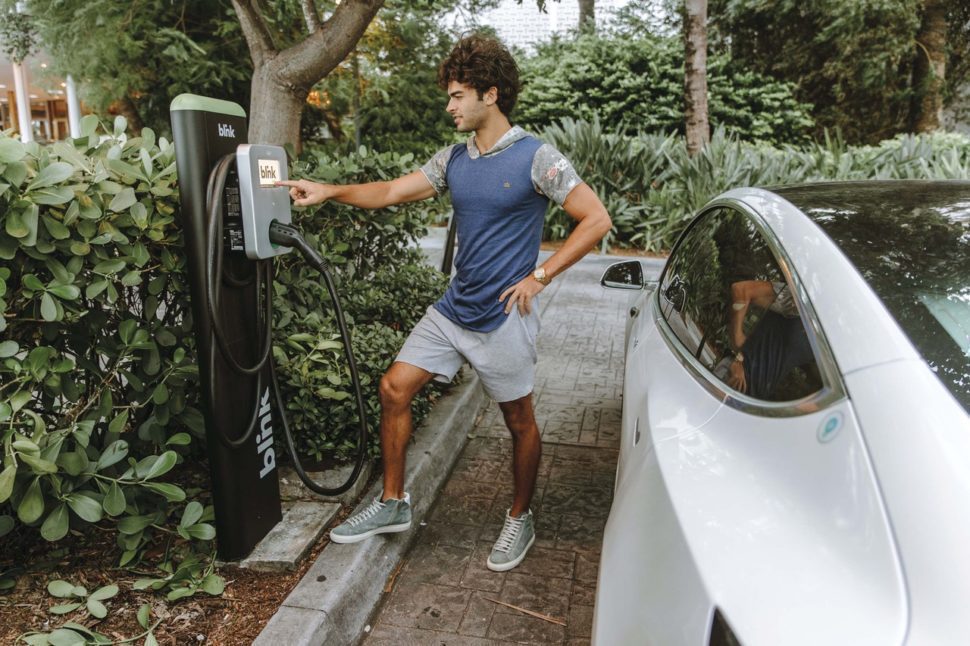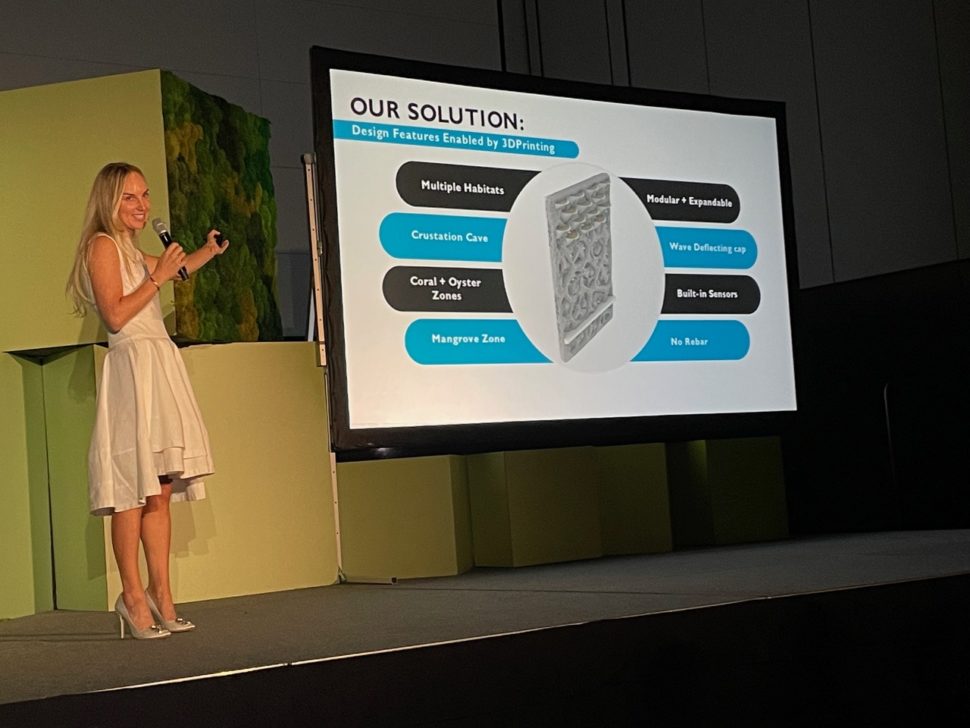By Riley Kaminer
While Miami may be at the frontlines of the climate crisis, we’re also at the forefront of climate tech innovation.
From flying cars and world-class conferences to carbon capturing cement and green crypto, climate is a key focus for South Florida entrepreneurs. Equally, some of the world’s top climate-focused innovators are choosing the Miami area as a launchpad for growth.
Here are five ways that South Florida is rapidly becoming a climate tech hub.
1. Combating climate change requires hard tech, and our founders are providing it
Hard tech is hard. But it plays an important role in addressing climate change. Increasingly, Miami companies are rising to the challenge, developing physical solutions to some of our thorniest environmental problems.
Take Broward-based Blue Frontier, which raised a $20 million Series A in July led by Bill Gates-backed Breakthrough Energy Ventures. Blue Frontier has developed a new type of air conditioner that can reduce electrical consumption by 50-90%. The startup is also pioneering a new “HVAC-as-a-Service” model for replacing the bulky, expensive legacy AC units found in large buildings.

Meanwhile, Carbon Limit is working to improve the process of making cement, which accounts for a whopping 7% of global CO2 emissions. This Boca-based startup has taken part in a Techstars cohort, as well as the Climate Change-focused Google for Startups Accelerator and FAU Tech Runway. Also in Boca, a serial entrepreneur is working to harness the power of the ocean as a renewable source for generating and storing energy.
In Miami, startup Kind Designs [pictured above] is developing living seawalls to help combat rising sea levels. And another local entrepreneur has developed a digital business card to help you go green without compromising style or functionality.
2. Software solutions are also key to unlocking climate innovation
When Refresh Miami caught up with environmental reporting startup SustainaBase earlier this summer, co-founder and CEO Gaida Zirkelbach told us that the private sector is increasingly looking for ways to monitor their environmental impact.

“Companies of all sizes are starting to really care about this issue,” she said. “It’s really exciting to see.” Their solution ingests data and helps clients understand – and act to reduce – their carbon emissions.
Local organizations are also showing an interest in bringing solutions from around the US to Miami. For example, the Knight Foundation just invested into New Orleans-based citizen engagement startup ISeeChange to expand across Miami-Dade County. The idea is that this digital platform will make it easier for citizens, civil servants, and companies to come together to address the effects of climate change by collecting data on flooding, heat, and pollution.
3. South Florida is pioneering carbon-free mobility
Traffic might be the most visible (and painful) symptom of South Florida’s bloated transit arteries. But it’s difficult to overstate the environmental impact of idling cars, long commutes, and the accompanying road infrastructure.
The good news is that achieving carbon-free mobility in Miami is within our reach – thanks, in part, to entrepreneurs working to develop sustainable transportation solutions.
Blink Charging, one of the largest companies in the US that designs, manufactures, and owns/operates EV charging stations. In June, Blink Charging announced that it acquired EV charging provider SemaConnect for $200 million.
“People used to throw me out of their offices and now they welcome me,” Blink Charging founder and CEO Michael D. Farkas told Refresh Miami, underscoring the change in perception about electric vehicle charging. “People used to ask me if I was a crackpot, and now they think I’m a prophet.”

Also on the cutting edge of EV charging is OBE Power, which has a unique offering. Instead of selling or leasing charging stations, OBE installs EV charging locations at no cost to the property owner.
Self driving cars are coming – and Boca Raton is emerging as a focal point. Autonomous vehicle monitoring company Guident just moved into the Boca Raton Innovation Campus.
What about ditching the traffic altogether? At least five air taxi companies are now circling the Miami market, from startups to major enterprises. We could be seeing flying eVTOLs (electric vertical take-off and landing aircrafts) within the next two years.

Back on land, scooting around South Florida is increasingly easy. Helbiz is currently the only scooter sharing provider active in the City of Miami, and has been able to expand further throughout the county. Miami is also home to two scooter stores with global footprints: Fluidfreeride in Little Haiti and NIU in Brickell.
4. The world’s top climate innovators are convening in Miami
Miami attracting major conferences and global speakers is nothing new. But Miami’s increasing prominence as a hub for climate conversations is a growing trend.
Tech solutions to climate change were in focus at the Aspen Ideas: Climate conference in May. Local and global politicians, entrepreneurs, and think-takers alike descended upon Miami Beach to share best practices and climate change solutions.
At Aspen, Mayor Daniela Levine Cava launched three new climate tech initiatives. First, a four-month pilot program with Austin-based startup Olea Edge to deploy AI-powered technology to locate meters that undercharge large commercial and industrial users.

Second, a partnership with two international accelerators to attract climate tech startups looking to prototype, test, and deploy their solutions in Biscayne Bay. Third, naming bluetech venture studio Seaworthy Collective Miami-Dade’s first startup in residence.
The future of mobility was on display at CoMotion in April. And there’s much more to come, including two separate smart city innovation expos happening in the next few months.
5. The crypto capital goes green
When it comes to crypto and the climate, there’s a lot of controversy… to say the least. It’s an evolving situation, but it’s already clear that companies in this burgeoning crypto capital are taking a more thoughtful approach to crypto.
For instance, NFT marketplace OneOf emphasizes its environmentally-friendly chops, having been built on green blockchain platforms Tezos and Polygon. That has resonated with investors, who have armed the startup with a $72 million war chest since last year’s launch.

Of course, it’s not just about crypto: blockchain tech more broadly can be harnessed for environmental good. Spanish startup ClimateTrade just put down roots in the Magic City, as part of its efforts to expand their decarbonization platform stateside.
But will there still be notoriously environmentally unfriendly fireworks during tech week next year? That’s still an open question.
Stay tuned to Refresh Miami for the latest in climate tech news. Have a tip? Get in touch.
READ MORE ON REFRESH MIAMI:
- Leaders put tech in the spotlight at Aspen Ideas: Climate conference in Miami Beach
- Blue Frontier raises $20M Series A for climate-friendly air conditioning tech
- Ocean power! Serial entrepreneur sets up shop in Boca to develop renewable energy startup
- Meet the entrepreneurs developing Living Seawalls to help combat rising sea levels, shaping the climate-tech space
- Carbon Limit’s cement turns concrete into a carbon capturing sponge
- TapTok’s digital business card can help you go green, without compromising style
- Catching up with environmental reporting startup SustainaBase: ‘Companies of all sizes are starting to really care about this issue’





